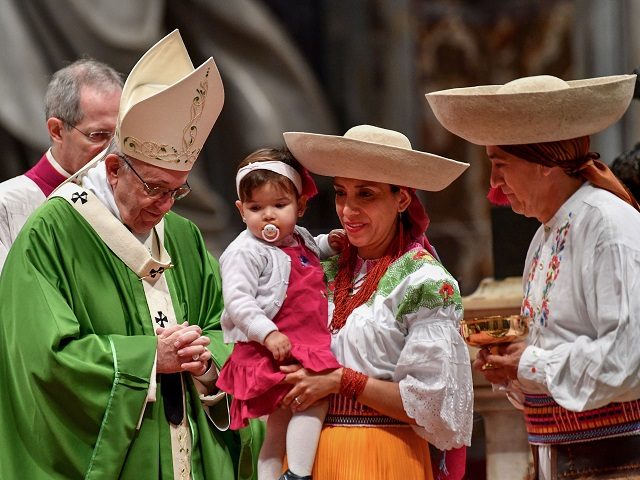In a nuanced address Sunday for the World Day of Migrants and Refugees, Pope Francis seemed to walk back earlier statements denouncing “xenophobia,” acknowledging instead that fears associated with mass migration are logical and justifiable.
“Local communities are sometimes afraid that the newly arrived will disturb the established order, will ‘steal’ something they have long laboured to build up,” Francis said in a Mass celebrated with migrants and refugees living in Rome Sunday. “These fears are legitimate, based on doubts that are fully comprehensible from a human point of view.”
Whereas it is normal to experience these fears, the Pope said in his homily, it may be wrong to let them control our actions.
“Having doubts and fears is not a sin,” he said. “The sin is to allow these fears to determine our responses, to limit our choices, to compromise respect and generosity, to feed hostility and rejection. The sin is to refuse to encounter the other, the different, the neighbour, when this is in fact a privileged opportunity to encounter the Lord.”
Earlier this month the Pope criticized those who challenge the wisdom of mass migration, accusing them of demagoguery and promoting xenophobia.
Those who decry “the risks posed to national security or the high cost of welcoming new arrivals,” are guilty of “demeaning the human dignity due to all as sons and daughters of God,” Francis said in his Jan. 1 message for the World Day of Peace.
To resort to such “rhetoric,” Francis claimed, people “are sowing violence, racial discrimination and xenophobia, which are matters of great concern for all those concerned for the safety of every human being.”
In his homily Sunday, the Pope quoted his own Message for the World Day of Migrants and Refugees, saying that every stranger who knocks at our door “is an opportunity for an encounter with Jesus Christ, who identifies with the welcomed and rejected strangers of every age.”
He repeated an earlier call for migrants to “know and respect the laws, the culture and the traditions of the countries that take them in,” while insisting that host societies “open themselves without prejudices to their rich diversity, to understand the hopes and potential of the newly arrived as well as their fears and vulnerabilities.”
Along with the legitimate fears experienced by nations facing waves of new immigrants, the Pope said that new arrivals “also have fears: they are afraid of confrontation, judgment, discrimination, failure,” which are also legitimate.
Earlier this week, an Italian archbishop declared that immigration must be “rational” because uncontrolled immigration leads to the “crushing and extermination of our society.”
“You can’t just open the doors, as if it were a party,” Archbishop Luigi Negri stated in an interview with Italian media Tuesday. It is essential to “highlight the economic, human and cultural costs of immigration,” since failing to do so means caving into “ideology.”
“I am a Catholic and therefore I believe in welcoming diversity,” said Negri, the recently retired archbishop of Ferrara-Comacchio and a close friend of Pope Emeritus Benedict XVI, “but this cannot be unmeasured because otherwise it leads to a crushing and extermination of our society.”
Asked why the globalist movement is pushing so hard for increased immigration, Negri said that the movement seeks to normalize mass immigration “because this serves the great globalized economy, one of whose objectives is to create a low-paid immigrant workforce.”
The archbishop claimed that in this regard, Pope Francis is being exploited by secularist society, which uses his words to justify their own positions, which have nothing to do with Christianity.
“Pope Francis is being instrumentalized by the reigning worldview,” Negri said. “Today there is a connivance between a certain Christianity and the secularist society, which the Church seems no longer able to say ‘no’ to, which in my view is exactly what is needed.”
Follow Thomas D. Williams on Twitter Follow @tdwilliamsrome

COMMENTS
Please let us know if you're having issues with commenting.